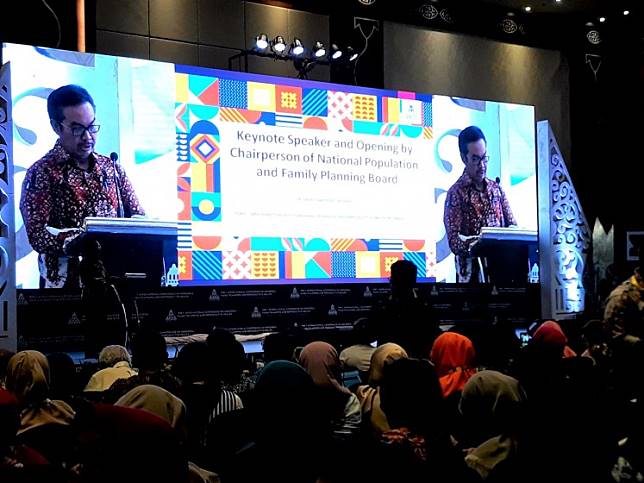Popular Reads
Top Results
Can't find what you're looking for?
View all search resultsPopular Reads
Top Results
Can't find what you're looking for?
View all search resultsFamily planning: Indonesia looks beyond population control
Indonesia's family planning program was once so successful that a Chinese minister disclosed that his country learned from Indonesia.
Change text size
Gift Premium Articles
to Anyone
I
ndonesia’s family planning program, once the country’s pride, has always been associated with the idea of population control.
The program, previously fully in the hands of the central government, enjoyed a golden era from the 1970s until 2001, when devolution left it in a phase of stagnation.
One of its accomplishments was bringing the contraceptive prevalence rate (CPR) to an outstanding 60 percent, which halved the total fertility rate (TFR) from 5.2 to 2.6 per woman.
The newly appointed chairman of the National Population and Family Planning Board (BKKBN), Hasto Wardoyo, recalled that, as soon as he took up his position in July, whenever he met people, he kept getting the same questions: “Why is the BKKBN no longer like in the past? Will it become a pioneer once again?”
Hasto, an obstetrician-gynecologist and a former regent of Kulon Progo in Yogyakarta, said it was hard to avoid the stagnation that coincided with the Reform Era and decentralization of power in the country.
He pointed to differences between the political environment of the present government and the authoritarian government of the past with its top-down command structure as well as differences in policies pursued by the BKKBN then and now.
“But we have to rise again. We should. The question is how. Back then, we did great in bringing down the fertility rate from 5.2 to 2.6. Wow, that became famous. Other countries learned from us. We were a religious country but could bring down the fertility rate,” he said after the opening of the 1st International Conference on Indonesia’s Family Planning and Reproductive Health in Yogyakarta on Monday.
Man on a mission: Chairman of the National Population and Family Planning Board (BKKBN) Hasto Wardoyo delivers his opening speech at the conference. (JP/Stevie Emilia)He said blame for the stagnation should not be placed squarely on decentralization. “In the past, there was a top-down doctrine, which was extraordinary. I was a doctor at a community health center in East Kalimantan for five years, so I know from [own experience]. I knew how to mobilize people [to push for the success of family planning].”
Currently, he said, it was the era of data transparency, where everything should be evidence-based. He cited as an example conflicting data on the maternal mortality rate (MMR), which had declined but then rose sharply after the Indonesian Demographic Health Survey (SDKI) of 2012.
Indonesia’s MMR remains high at 305 per 100,000 live births as of 2018/2019, but back in 2007, it was recorded at 228 and later, after the survey, it rose to 359.
With the high rate Indonesia failed to meet the Millennium Development Goals (MDGs) target to reduce maternal mortality to 102 deaths per 100,000 live births by 2015. Last year, the government said it would make a second attempt, this time to meet the Sustainable Development Goals (SDGs) target – where the bar was even higher by setting a goal of bringing maternal mortality down to only 70 deaths per 100,000 live births by 2030.
The conference’s chairman, Siswanto Agus Wilopo, a professor at Gadjah Mada University (UGM)’s Center for Reproductive Health, recalled that some countries had made Indonesia their role model for family planning.
He said China’s population and family planning minister had disclosed in front of thousands of people that China had learned family planning from Indonesia.
“We have to be proud [of our family planning program], but in the past ten years, nobody seems to have heard of it; that does not mean it’s not moving forward. The conference aims to communicate that we’re not letting up in our program.”
He said the conference aimed to put family planning back in the spotlight, in line with President Joko “Jokowi” Widodo’s vision and mission to develop the country’s human resources.
“Family planning is very important, we have to inform our youngsters, who in the next five to 10 years will enter the workforce, so they can become great human resources,” he said.
“We have to change our mindset that family planning is not just about population growth but also about producing quality human resources.”
More than 800 participants from seven countries are taking part in the three-day conference around the theme “Role of Family Planning in Reducing Maternal Death and Increasing Family Wellbeing”.
The event was initiated by a consortium called A Champion of Indonesian Family Planning and Reproductive Health, members of which include NGOs, universities and civil society groups, such as the United Nations Population Fund (UNFPA), Rutgers Indonesia, Johns Hopkins University Center for Communication Programs, University of Indonesia’s School of Public Health, UGM’s Center for Reproductive Health, ThinkWell and the Indonesian Planned Parenthood Association (PKBI).
Expected to be held every two years with different themes, the conference is jointly organized in a partnership between the BKKBN and the Health Ministry.
Meiwita Budhiharsana, professor of public health at the University of Indonesia, who chairs ICIFPRH’s scientific committee, attributed the success of reaching the TFR target to women’s participation in family planning.
“On the one hand, women are grateful for family planning, since it teaches them to plan their reproductive cycle. Indonesians rarely make plans, especially on the number of children they have, and BKKBN has helped educate us to plan that,” she said.
“But on the other hand, the program should be grateful to women as well. What we expect from the conference is a clear path.”
It should also be brought to attention that planning, Meiwita said, often related to other factors beyond women’s control, such as pregnancy and having children, with regard to domestic violence, one of the conference’s main topics.
“Another issue is reproductive rights of all women – not just married ones. Young people also have those rights. The rights to full information and quality services,” she said.












